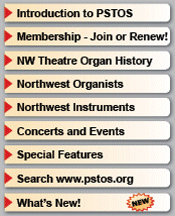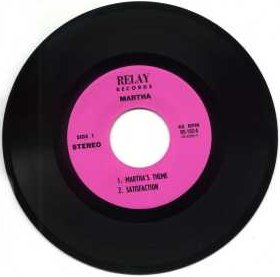


Recordings of Northwest Theatre Organs
Record review from Theatre Organ, December 1969:
Back to the Northwest Theatre Organ Recordings page
Martha!
1969, Relay Records #RS102
The following review was submitted furtively- and we think we know why.
"MARTHA.*" Martha Lake playing her favorites at the console of a theatre organ which had better remain unidentified. RS 102, 45 rpm, stereo only. $1.50 postpaid from Relay Records, 8606 35th N.E. Seattle, Wash. 98115.

Here, at last, is the inimitable Martha Lake on record with her own arrangements of two old standards and a pair of more recent songs. This disc deserves a place of honor somewhere on the bottom shelf of every theatre organ buff's record library. Although it was cut at 45 rpm this reviewer finds that playing the record at 78 rpm gets it over with a lot faster.
The opener, "Martha's Theme", also known, I believe, as "Ah Superb!", is launched upward with a lurching-outof-the-pit intro that would make any veteran theatre organist's heart stop; the auto horns, klaxons, and bird calls interrupting the howling of the untremmed heavy reeds add a touch of that playfulness for which Miss Lake is so infamous.
The first chorus smacks of an old Wurlitzer Band Orgart, with the addition of an obnoxious solo reed to aggravate the subtle dissonances of the accompaniment. There is an interesting misuse of piano and tambourine in the second chorus, which finishes with cymbal accents and a final arpeggio on hardware over untremmed reeds to stagger the imagination.
The faltering gaiety of the first piece is followed by a thing called "Satisfaction,'' which is fascinating. With bell and chime accents only too audible, the famed "Abyssinian Stringed Oboe" drags the melody unwillingly through the first chorus. The dissonant quality of this rare and beautiful instrument comes across so effectively that at times, it would seem to the untrained ear that the melody and accompaniment are actually being played in entirely different keys! A quiet bridge into the second chorus is enhanced by a jab at the "cough" piston, an interesting effect not found on many organs. In the last few bars full organ is detonated and the bellowing of the pipes almost succeeds in drowning out the Stringed Oboe as it follows bell and pipe arpeggios, working its way up to a final, crunching chord.
"Zo Vot's Gnu?" is done up in "rickety-tick'' style on piano and Stringed Oboe, while a mercifully obscure horn provides second touch counteroffensive. Martha's rocky piano-thumping technique is reminiscent of a willingly forgotten bad dream. Portions of "Nola" are thrown into the verse to counteract the melody and, after some more bird and klaxon accents during the bridge, she romps through the second chorus in a thwarted attempt at dazzling digital dexterity. The cymbal, introduced near the end, adds the final blow to this amazingly executed piece of "Roaring 20's" legerdemain.
"Climbin' Out of My Bed" is introduced by untremmed heavy reeds in the top and bottom registers, which slowly give out to become Xylophone and anaemically untremmed pipes pushing the melody along over a triangle and chinese block accompaniment. As she stumbles into the chorus Martha first cancels and then reapplies the trems, as ranks pile up in a vain attempt to overcome the "toys" in the background. The smashing of glass is heard as Martha's bifocals shatter on the floor after sliding off the end of her nose. Unable to stop now, Martha blindly throws on the piano with pipes again untremmed, and then on goes the throb-motor for the riffs. The last chorus ends with a straight organ "rollantando" punctuated by a punch of the "flush" piston, whence the plumbing in the Solo loft washroom takes over for a bar. This authentic sound is augmented by a clever device called simply "soap dish," which crashes onto a tiled surface for a "crockery-smash" effect. A final chord with cymbal crashes and chopping trems finishes off the disc. Completely.
A great deal of relaxation is obvious in this record. Miss Lake's loose, almost disjointed playing style, points to years of organ lessons she didn't waste time taking, and of the hours of practice before taping which she deemed unnecessary. Listening to the characteristic sound and recorded quality of the organ leads one to think wistfully of the hours that could have been spent tuning and voicing the pipes. The cumbersome pulse of the untamed tremulants is a tribute to the unerring lack of diligence on the part of technicians who refused to tamper with the organ's "natural" sounds.
Summary: A must for every theatre organ buff who thinks he has heard everything.
--J. Geoffrey F. Paterson (Guest Reviewer)
About this site © PSTOS, 1998-2004